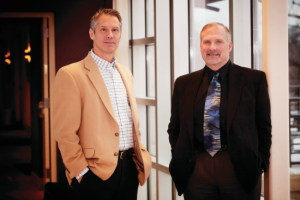By Doug Von Feldt and Thomas UnderwoodCenter for Organizational Excellence, Washburn University
As a process improvement professional development and consultation service based at Washburn University, the Center for Organizational Excellence has had the opportunity to serve a variety of organizations with unique challenges and customers, including that of the University. Social and technological change affects organizations of all types, but education in particular is changing in many ways, including online learning, changes in the way classes are taught, utilization of facilities, adapting to changes in technology, and, of course, decreased funding.
One application of process improvement to higher education is to consider Lean principles. Found and used in just about every industry, Lean has the ability to help address these changes by better understanding how these processes work and ensuring they are as efficient as possible. One of the key Lean tools to help with efficiency is the Value Stream Map (VSM) which is a representation of all work that happens in the effort to provide a product or service. The goal of VSM is to document the current and future state process to identify and eliminate all non-value activities. By doing this, the process becomes more efficient and responsive to delivering only what the customer (student, parents, community, employers) desires in the least expensive way. The typical activities used in a VSM process include:
- Create the current and future state map
- Walk the current Value Stream to identify waste
- Document and create projects to eliminate the waste
- Execute the projects
While eliminating waste is a worthy and valuable goal in itself, it is essential that organizations - including higher education – focus on the main customer during these improvement projects; for higher education that main customer is the student. Process improvement projects in education should focus on the student by adding a step in the general VSM process mentioned above. The step is called “STUDENT focused analysis (SFA)” and goes between steps 2 and 3. The STUDENT part of FSA is an acronym for the seven student concerns that should be managed during any process in the education system. STUDENT means:
- Stressed – Stressed about what to do, where to go, or when to do it
- Trapped – The feeling that nothing can be changed and there aren’t any good solutions
- Uninformed – Not sure what to do or where to go
- Depersonalized – Feeling of being a number and not a person
- Embarrassed – Not comfortable about level of knowledge and don’t want to ask
- Neglected – Not being able to get help
- Terrified – Feeling scared and out of place
The new general VSM process becomes:
- Create the current and future state map
- Walk the current Value Stream to identify waste
- Walk the current Value Stream to identify STUDENT related concerns
- Document and create projects to eliminate the waste and STUDENT concerns
- Execute the projects
The challenges facing higher education make the application of Lean principles not only appropriate, but necessary. While higher education generally has not been known for its utilization of Lean Six Sigma processes, Washburn has taken steps to incorporate Lean Six Sigma. A recent article in Quality Progress described the Lean Six Sigma undertaken by the University of Miami (Ohio) that realized over $27 million in cost improvements since 2009. Thus, Lean Six Sigma generally, and Lean principles in particular, are applicable to any industry and organizational type – including higher education.
--------------------------------------------------------------------------------
 Doug Von Feldt Lean Six Sigma Master Black Belt Certified Project Management Professional
Doug Von Feldt Lean Six Sigma Master Black Belt Certified Project Management Professional
Doug Von Feldt is the primary developer of the curricula used by the Center for Organizational Excellence at Washburn University and serves as the lead instructor/consultant. Doug has over 20 years of experience leading projects and change initiatives in industries including manufacturing, distribution, education, and retail. He has held senior leadership positions including CIO of two different organizations along with other leadership roles in the areas Continuous Improvement, Innovation, Project Management, and Operations. Doug’s current work focuses on helping organizations become more profitable by aligning work processes, people, and culture to achieve operational effectiveness and efficiencies.
Doug has helped numerous companies implement Continuous Improvement, Project Management, and Innovation programs. He has authored training material in several disciplines including Lean Six Sigma and Innovation and has taught thousands of people all over the world. He regularly speaks at conferences in the areas of lean six sigma, process improvement, innovation, and project management. He is a contributing author to the book “Next Level Supply Management Excellence: Your Straight to the Bottom Line® Roadmap” (J. Ross Publishing).
Doug holds a BA in Computer Information Systems from Washburn University. He is a certified Lean Six Sigma Master Black Belt and a certified Project Manager (PMP). He is a senior member of the American Society of Quality and has been a Baldrige Performance Excellence Program examiner.
Thomas Underwood Assistant Dean for Academic Outreach
As the Assistant Dean for Academic Outreach, Thomas Underwood is responsible for the overall management of non-credit professional education, including planning, development, implementation, and evaluation. He also serves as the Executive Director for the Joint Center on Violence and Victim Studies, a consortium program between Washburn University, California State University-Fresno, and the University of New Haven.
His primary areas of expertise include professionalism, adult education, and social service practice and policy. He regularly instructs professional development courses and conferences and he has several written publications in these areas. He also serves as an adjunct instructor for the Department of Human Services at Washburn University and the Criminology Department at California State University-Fresno.
Thomas has a doctorate in Adult and Continuing Education for Kansas State University, a Masters in Public Administration from the University of Kansas, and a Bachelor of Arts in Criminal Justice and Sociology from Washburn University.

